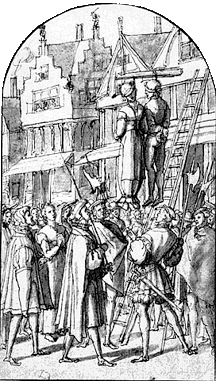 |

|
|
ANABAPTIST MOVEMENT
The Anabaptist movement officially began in the
sixteenth century although Christians of similar theology
and circumstances have existed since the third century.
Not to be confused with the term anti-Baptist, Anabaptist
Christians challenged the reforms of Martin Luther
and others during the Protestant Reformation,
rejecting infant baptism in favor of baptism (or re-baptism)
as believing adults.
The early Anabaptists were closest to the Waldensians
in their beliefs. The Waldensians originated, about 1160
A.D., in Lyons, France with Peter Waldo, after he discovered
huge discrepancies between Scripture and the Roman Catholic
Church's doctrines. A wave of God's Spirit was
already evident throughout Europe, however, the first sign
of emerging Anabaptist was in Zurich, Switzerland under the
leadership of Konrad Grebel a disciple of Ulrich
Zwingli.
Zwingli believed in a strong Scriptural foundation and he
placed much emphasis on the hypocrisy of compromise. He
taught his followers about ungodly Roman Catholic
mandates such as indulgences (money charged for prayer),
worship of images, relics, and saints (icons), the
sacramental view in the mass, and enforced celibacy.
However, when Grebel and Zwingli's disciples took the next
logical step, in actively "forsaking all" to follow Christ's
example and Biblical teachings, Zwingli retreated and became
their enemy and persecutor. |

WORLD RELIGIONS
COMPARED
WORLD
RELIGIONS CLIPART |
Grebel and his Swiss Brethren openly taught that the Bible negated
the practice of infant baptism and other unscriptural practices,
much of which Zwingli was not ready to forsake. Again the Word of
God became the focal point which divided between "soul and spirit",
as it discerned "the thoughts and intents of the heart" of those in
authority. Under severe persecution from Zwingli, Grebel soon met
his death.
Because of their firm stand taken against infant 'baptism', in favor
of believer's baptism, Grebel and his Brethren were mockingly called
'Anabaptists' as the Greek prefix 'ana', means go backwards (again
or against).
 |
AMISH: The
Amish are very devout in their faith. They believe in
the literal interpretation and application of Scripture
as the Word of God.
|
 |
CHURCH OF THE
BRETHREN: The Brethren are Anabaptist (reject infant
baptism) and Pietist (emphasize holy living). Brethren
have historically accepted the basic Christian doctrines
along with practices sometimes neglected by major groups
of Christians.
|
 |
HUTTERITES:
Pacifists who take no part in politics and remain
separate from outside society. Most Hutterites were simple people
who had little or no schooling. They believed
"literally" everything Jesus said in the Bible.
|
 |
MENNONITE:
As one of the historic peace churches, Mennonites are
committed to nonviolence, nonresistance, and pacifism.
|
Although many beliefs are shared
between Protestants and Anabaptists, there is a fundamental, root
difference between them. Generally, the word Protestant denotes the
doctrines and practices derived from the champions of the
Reformation; including Calvin, Luther, Knox, Zwingli, etc. The main
spirit of Protestantism was the "protesting" of abuses in the
Church's secular and religious power. Depending on the situation,
this could range all the way from simple debate to
physical violence. Therefore the focus of Protestantism tended to
center on the Church's abuses and their reform.
On the other hand, the Anabaptist's believe that the world is controlled by
the "prince of this world". They believe that Jesus told them to
focus on "the kingdom of God and its righteousness". This
naturally separated them, as it did the early Church, from being
part of the world and its system, then controlled by the Church at
Rome. Therefore their focus was only on Jesus Christ, and loving and
doing His will. If they were against anything, it was sin in the
kingdom of God. The Anabaptists did not see the "kingdom of God" as
the Church at Rome.
Let me ask you one question
Is your money that good
Will it buy you forgiveness
Do you think that it could
I think you will find
When your death takes its toll
All the money you made
Will never buy back your soul...
Bob Dylan, Masters of War

| |
 |
 |

